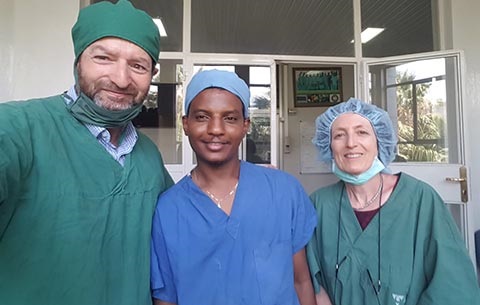
Jerusalem’s Hadassah Medical Center brings Israeli medical advances to Ethiopia to help the East African country prevent the spread of infectious diseases.
JERUSALEM–With a mission to help strengthen infection prevention and control at Ayder Comprehensive Specialized Hospital in Mekelle, Ethiopia, infectious disease specialists from the Hadassah Medical Organization recently paid a visit to offer their help.
Prof. Allon Moses, chair of Hadassah’s Department of Clinical Microbiology and Infectious Diseases, led the team from Hadassah. Accompanying him were Carmela Schwartz, nursing director of Hadassah’s Ambulatory Center for Infectious Diseases; Dr. Shmuel Benenson, head of Hadassah’s Infection Prevention and Control Unit; and Tamara Zeiter, a senior microbiologist at Hadassah. Prof. Moses and Schwartz are slated to head up Hadassah’s new Infectious Disease Center, scheduled to open shortly.
“We felt that there is a great spirit and desire to advance in infection prevention and control,” notes Schwartz. Although the Hadassah specialists acknowledged that limited resources impose a real challenge to implementing strategies and guidelines for infection prevention and control, they are optimistic that their visit was helpful in assessing some of the problems and suggesting solutions.
In her follow-up letter to her colleagues at Ayder Hospital, Schwartz thanked them for their “extraordinary hospitality” and offered the possibility of an Ayder infection prevention team coming to Hadassah for training. Hadassah’s infectious disease team plans to return to Mekelle in late May or early June.. They will be joined by Hadassah orthopedists who will be going to Ethiopia for their second mission as part of Hadassah’s Scoliosis Surgery and Education Campaign. Through this campaign, Hadassah’s spine specialists undertake complex spine surgery on Ethiopian children, surgery that is simply not available in their region. Read about their extraordinary first mission.
At Ayder Hospital the Hadassah team emphasized was the need for education in basic infection prevention for every single health care worker. The team noted that some of the units that were demonstrating good infection protection practices could be role models for the others.
Aside from stressing the need to strengthen hand hygiene across the board, the Hadassah team also brought to their colleagues’ attention the hazard of reusing single-use items and the importance of effective sterilization procedures. The report explained, “Reprocessing of medical equipment is a great challenge, be it surgical instruments, endoscopes or respiratory equipment. Reuse of devices defined as single-use equipment poses an even more serious threat of transmission of microorganisms from patient to patient, because those items are often designed in a way that impedes proper cleaning and disinfection.”
Acknowledging the challenge of a limited running-water supply, the Hadassah team suggested that hand hygiene could be accomplished with alcohol-based hand rubs and urged the use of hand sanitizers throughout the hospital.
In addition, the team recommended that Ayder “dedicate special infection prevention practitioners, preferably nurses, whose sole commitment is to the many tasks of infection prevention.” Specifically, the recommendation was one full-time nurse for every 200 hospital beds.
Other recommendations covered securing the cleanliness of the hospital patient rooms and operating rooms after patient discharges. Throughout the report, the team noted the utmost importance of monitoring the implementation of the various infection protection guidelines, with feedback regularly collected and evaluated.
Another suggestion was to determine the prevalence of resistant bacteria. To accomplish that, the Hadassah specialists offered to have one of their microbiology lab technicians come to Ayder for a few days and bring the needed lab equipment to conduct the assessment.
The above is just a sampling of the recommendations the Hadassah specialists offered in their comprehensive and detailed report for their colleagues. At the same time, the report paid tribute to the efforts Ayder has already made to improve their infection protection, noting that these efforts are yielding results. The challenge, they wrote, is to close the gap between theory and practice.
Source: hadassah.org
